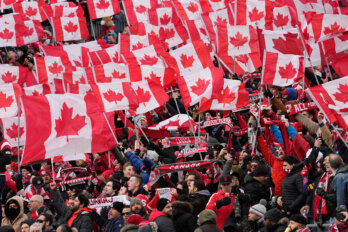W hen I was a kid, I would play ball hockey on our dirt road and celebrate a goal—hands raised, pretending to throw gloves in the air—as if I had won the Stanley Cup in overtime. My team was imagined, the crowd make-believe.
The inaugural 4 Nations Face-Off, invented out of thin air to replace a meaningless and listless National Hockey League All-Star Weekend this year, was basically a souped-up version of pick-up hockey. It was televised shinny with some of the world’s best players. There was no Olympic spirit, no professional weight—be it the NHL crest or a massive paycheque—and no hopeful, career-making energy of the World Junior Hockey Championship.
And yet there was weight. In any other year, a tournament like this would have made few headlines, come and gone with die-hard hockey fans tuning in and then quickly turning back to the NHL season. But this, already, is no ordinary year. Not for politics, not for the economy, not for the future, and not for sports.
Despite three games among Canada, the United States, Sweden, and Finland, the tournament truly ignited when the two North American rivals faced off in their round-robin game. Before either team took a shot on goal, or even made a single pass, there were three fights in the first nine seconds. It was almost inevitable after what had transpired between the two countries in the months and weeks and minutes leading up to the puck being dropped.
Since winning the US election, President Donald Trump has repeatedly threatened a deluded desire for Canada to become his country’s fifty-first state. It may feel easy to write it off as yet another rant of a fool, but it’s a serious threat and a threat that should be taken seriously. He has menaced with broad tariffs, backed down, then locked some of them in. And Canada has responded with a kind of patriotism that is uncomfortable to many north of our shared border.
In the hours before the final game of the 4 Nations Face-Off, Trump reiterated his threat of annexation again on social media, that Canada “will someday, maybe soon, become our cherished, and very important, Fifty First State.” With major policy decisions seemingly made on a whim and a mood, it would not have been beyond reason to assume that a hockey game could tip Trump over the edge—and a new ridiculous set of tariffs and aggressions would be lobbed our way.
And then when the two teams lined up to face each other for the first time, in Montreal, fans booed the US national anthem. It was an unusual expression of bitterness, but one where the only fair assumption of intention was: we’re not booing you, we’re booing him.
There’s often talk about how sports transcend: efforts continue to resonate long after the final whistle, actions on ice or field or court supersede the score, moments become symbols. So it was also almost inevitable that Canada and the US would end up in the final. And that the game would end up tied and go to overtime—just like the same matchup did during the 2010 Vancouver Winter Olympics when captain Sidney Crosby scored the “golden goal.” This time, too, Canada won—with a brilliant overtime performance by beleaguered goalkeeper Jordan Binnington and the winning goal scored by Connor McDavid. Within minutes of Canada’s win, Prime Minister Justin Trudeau posted on social media: “You can’t take our country—and you can’t take our game.”
Often, the mist of make-believe evaporates: we’re not really holding the Stanley Cup, there is no crowd really chanting our team’s name, we go back home to our mum who’s made post–ball hockey snacks and back on the school bus the next morning. But sometimes the things we create in make-believe, the things we dream up in our imaginations amid the chaos and consequence of reality, actually can mean a lot. It may have been a made-up tournament, a contrived faceoff with a Fisher-Price trophy—but that was a real win.
On Friday, April 25, join us for The Walrus Talks at Home: Tariffs. Four expert speakers will discuss what the U.S. tariffs on Canada mean, both now and in the future. Join us online. Register here.




